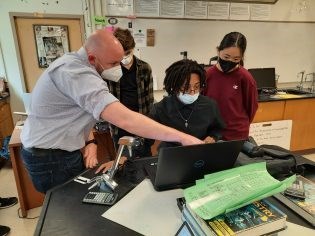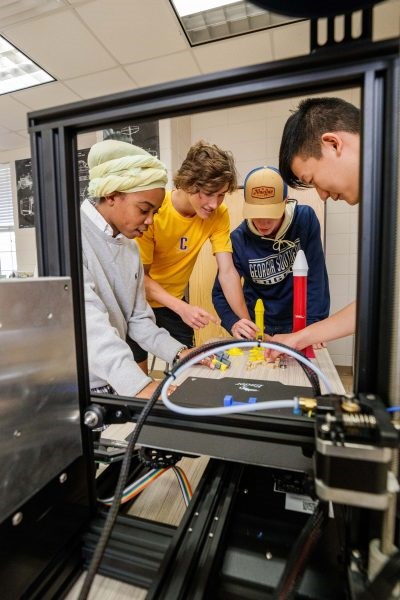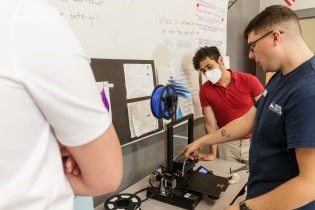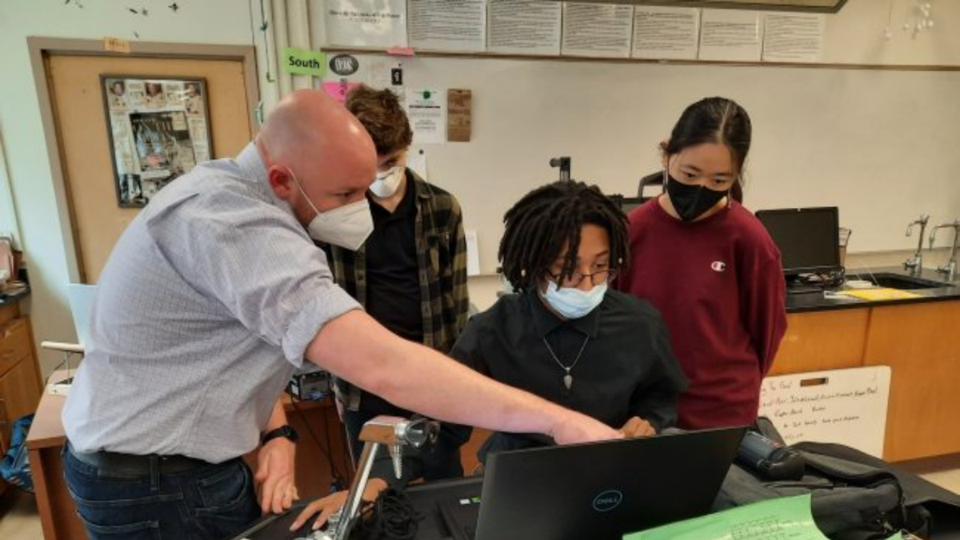More than a decade of service in the Navy led Kevin “Mike” Hasty to develop a passion for oceanic preservation and pollution reduction. As a mechanical engineering major in the Allen E. Paulson College of Engineering and Computing at Georgia Southern, he found a way to blend his passion with his area of study through a mentoring opportunity during the Engineering Design Challenge (EDC) 2022: Eagle-3D.

EDC is an annual engineering design competition in which Georgia Southern students coach local high school students through engineering projects that are then put to the test. This year’s competition has seen Savannah-area high schoolers work to assemble a 3D printer and use it, along with various modeling software, to reverse engineer and print an object of their choice. From rockets to water filters, the objects chosen have been varied.
Hasty is one of six student coaches from Georgia Southern who participated in this year’s challenge. He has spent at least one day each week since January, including during his own spring break, working with a team from Savannah Arts Academy. He was excited to find that his team had chosen to tackle their own water pollution problem through the competition.
“The students I’m working with thought, ‘What’s a problem in the world that we can help solve?’” Hasty said. “Access to clean drinking water is a global issue and they decided that they could create a 3D-printed water filter and make it more accessible. Then, they looked at the filter they are reverse engineering and thought, ‘How can we improve it?’”
Hasty also recognized that the skills being taught through this competition are directly applicable to real-world problems caused by the COVID-19 pandemic.
“Going back to the start of the pandemic, we were short parts for face shields, we were short parts for respirators, for masks, and people used 3D printing to take existing products and reverse engineer them to make them available for everyone,” Hasty said. “We proved that we can come together and actually make the world a better place, so the fact that high school students can see that and recognize that learning these skills is a worthwhile cause is exceptional.”

The teams have worked not only on engineering problems, but also on learning to leverage the resources available to them to build a better project.
“Originally, I was just hoping to teach them how to do basic measurements, how to use a set of calipers, how to use SolidWorks and 3D modeling in general,” Hasty said. “I’ve actually been able to expand that and encourage them to expand what they are trying to accomplish with this project. We encouraged them to talk to local companies to build relationships instead of just ordering something online and really use the resources available to them. What we’ve actually been able to do is teach them to look at problems from multiple perspectives and try to find more inclusive, detailed solutions.”
Wayne Johnson, Ph.D., professor of mechanical engineering in the Allen E. Paulson College of Engineering and Computing, has been championing this competition for years because he sees the value both the high school students and Georgia Southern students receive from the experience.
“We get to introduce the high school students to skills that they will need to be successful coming into an undergraduate engineering program,” Johnson said. “Our engineering students get experience in project management and in mentorship, but they also get to see applications of the concepts that we’ve talked about in class. This is one of the ultimate goals of why we do what we do, so that our students will be able to take what they’ve learned and apply it organically in appropriate situations.”
As with previous years, Johnson has been proud of the work accomplished by the teams and their student coaches.
“The high school students are doing freshman-level engineering work,” Johnson said. “It’s really incredible. I feel grateful for this opportunity to be able to work with really great students. Our students are excited to help and they’re hungry for these opportunities outside of the classroom. It’s been a pleasure and very much a rewarding experience to watch them grow and be excited.”

EDC 2022: Eagle-3D is held by Georgia Southern University and sponsored by NASA, Georgia Southern University Department of Mechanical Engineering, Georgia Space Grant Consortium and Gulfstream. This year’s competition includes teams from Herschel V. Jenkins High School, Calvary Day School, Groves High School, Savannah Arts Academy, Woodville Tompkins High School and Portal High School.
The final event of the competition returns to the Armstrong Campus in Savannah in person this year at 1 p.m. on April 23. Additional information about the competition can be found at GeorgiaSouthern.edu/ArmstrongEDC.




